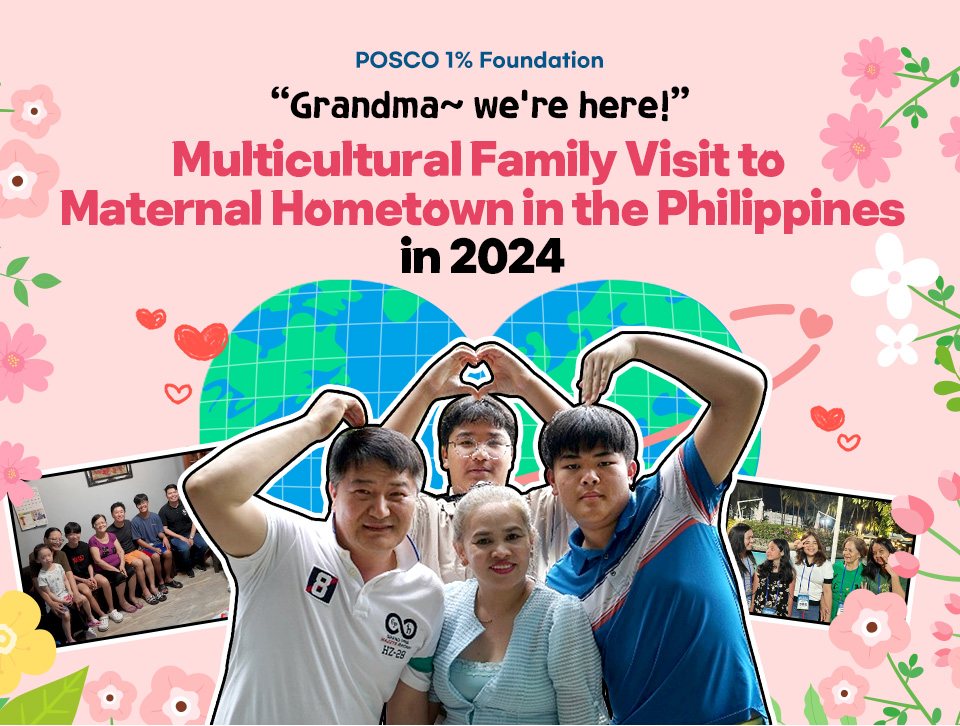
In January 2024, the POSCO 1% Foundation launched a project in Pohang and Gwangyang to assist multicultural families, particularly Filipino immigrant women residing in these areas who hadn’t visited their home countries for more than three years, in reconnecting with their roots. Let’s take a look at the heartwarming story of multicultural families visiting their maternal hometowns.
![]()
In January, the POSCO 1% Foundation launched the New Year’s maternal family’s home visit program in Pohang and Gwangyang so that multicultural families in the area could experience the culture and lifestyle of their mothers’ hometowns. This initiative was specifically tailored to address the needs of Filipino immigrant women, who have fewer chances for family reunions compared to those from Vietnam or China. The primary objective was to establish a support network for the mother’s family so that children could explore their potential and uniqueness while fostering better understanding between spouses. Ultimately, the program aimed to create a nurturing environment for the holistic growth of all family members.

The families’ desperation was deeply understood, leading to a meticulous selection process. Pohang-si and Gwangyang-si Family Center and the POSCO 1% Foundation Project Selection Committee strictly reviewed multicultural families with women who have not visited their home countries for more than three years in Pohang and Gwangyang. Immigrant women shed tears thinking about their families during the assessment. Eventually, six families were chosen. Prior to their trip to the Philippines, they engaged in pre-programs at the family center to develop communication and unity with the families.
![]()
In January, the six selected families embarked on a journey to the Philippines to reunite with their loved ones. The faces of family members gathered at the airport were filled with anticipation, and their hands were full of gifts for their Filipino relatives.
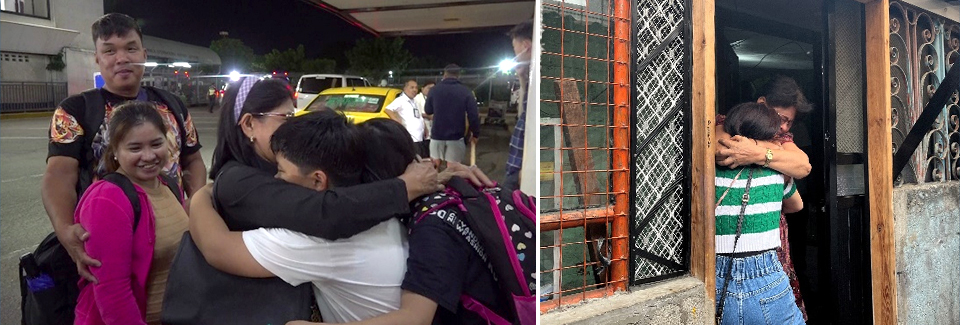
Upon reaching the Philippines, families separated for 6 to 10 years tearfully reunited with local relatives and spent a week together as planned. Some attended a sibling’s wedding, while others pooled funds for long-awaited trips. The families, who had been unable to make time for themselves due to their livelihoods, bonded during a week-long tour of Manila and nearby cities, and created lasting memories.
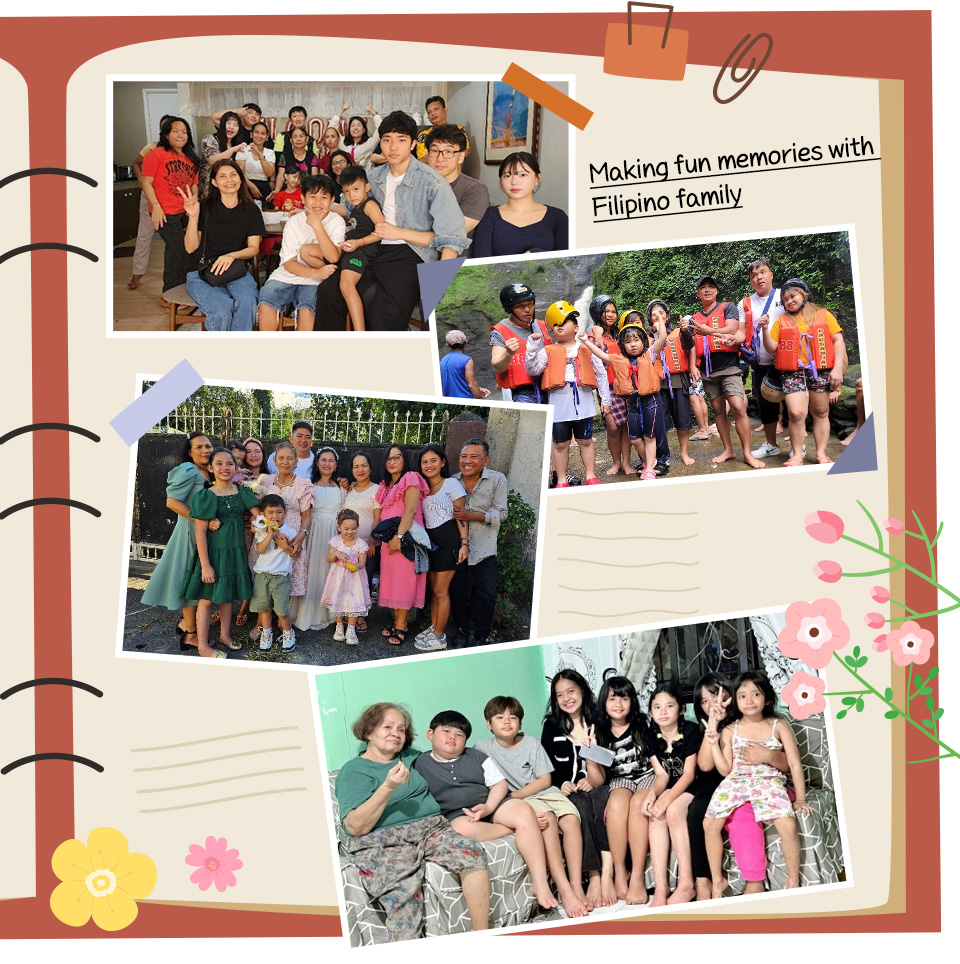
The POSCO 1% Foundation and the family center visited the hometowns of the marriage migrant women, saw families coming together, and experienced the practical realities of life in the Philippines. Local residents warmly welcomed the returning marriage migrant women and expressed gratitude for the support provided by the POSCO 1% Foundation.
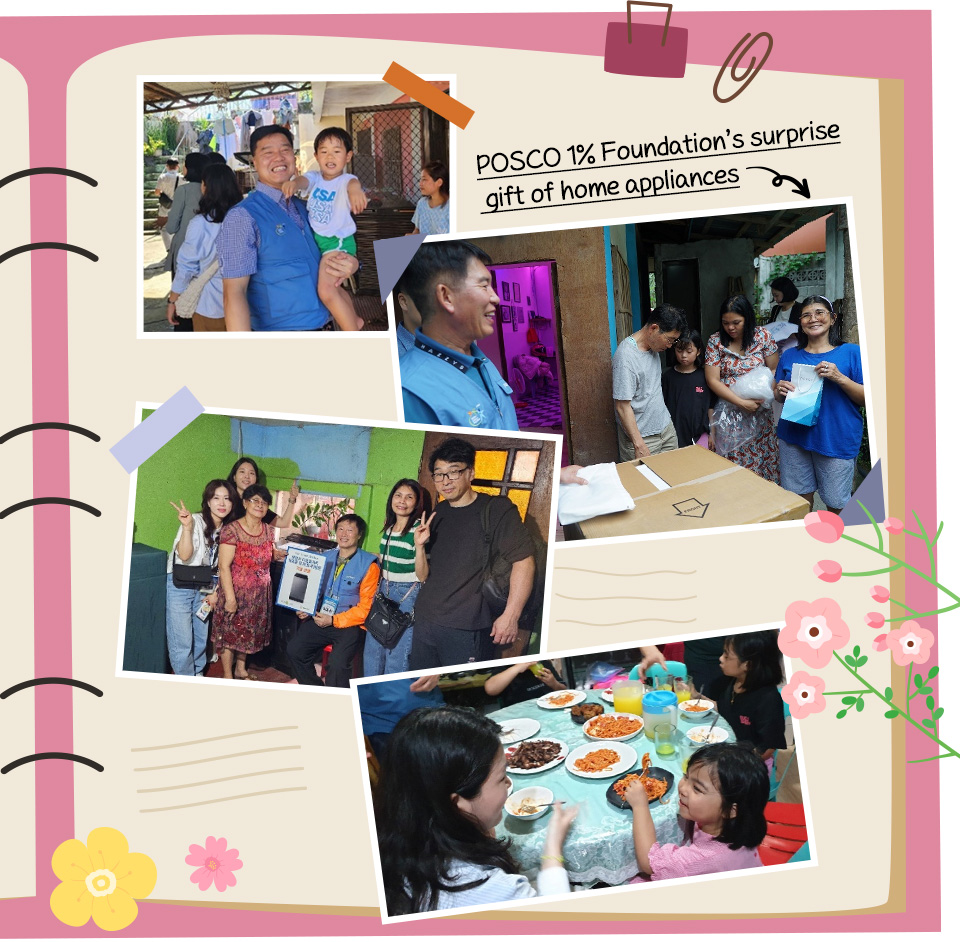
The POSCO 1% Foundation prepared surprise gifts such as refrigerators, TVs, and washing machines, and donated them to families as a token of appreciation on behalf of more than 35,000 donors to convey their heartfelt sentiments.
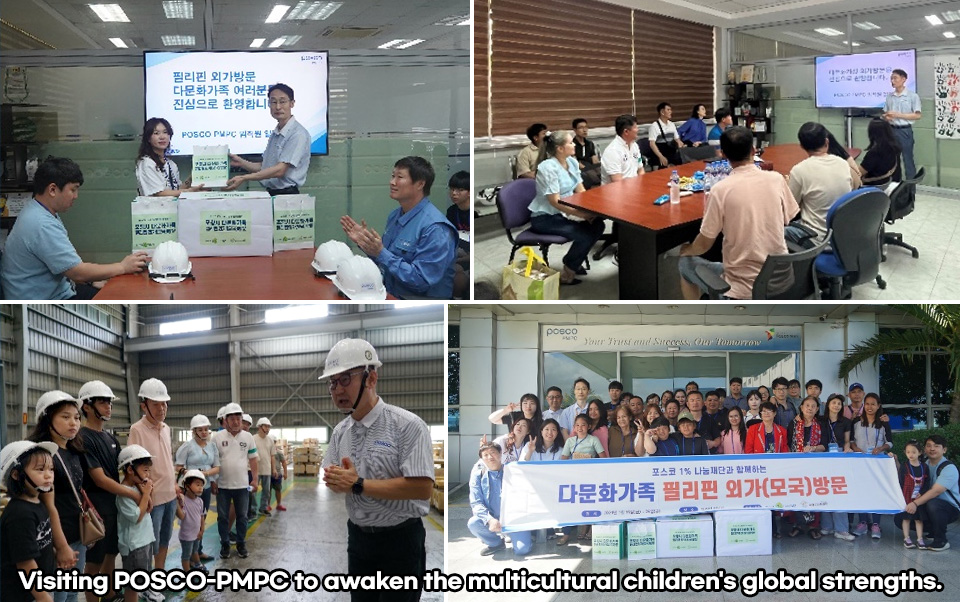
Moreover, the families had a meaningful time to help nurture their multicultural household children into global talents. They toured the Manila Processing Center (POSCO-PMPC) in the Philippines under the guidance of Director Wi-don Kang and met with the director and local staff. During the gathering, Director Kang and the local staff offered meaningful career advice to the children. They emphasized that children from multicultural families in the Philippines, proficient in languages such as English, Korean, and Tagalog, possess a competitive edge as global talents. Furthermore, they highlighted the possibility of these children working for POSCO in the future, even in their motherland, the Philippines.
This trip by multicultural families to the Philippines was not just a mere visit, it empowered marriage migrant women to lead their families during the visit to their homeland and enhance their self-esteem. It also gave their husbands invaluable insights into their wives’ cultural background. For the children, it offered an opportunity to experience their mother’s culture, motivating them to embrace diversity and develop into global talents with a positive sense of identity. Let’s look at the vivid feedback from the families who participated in this event!
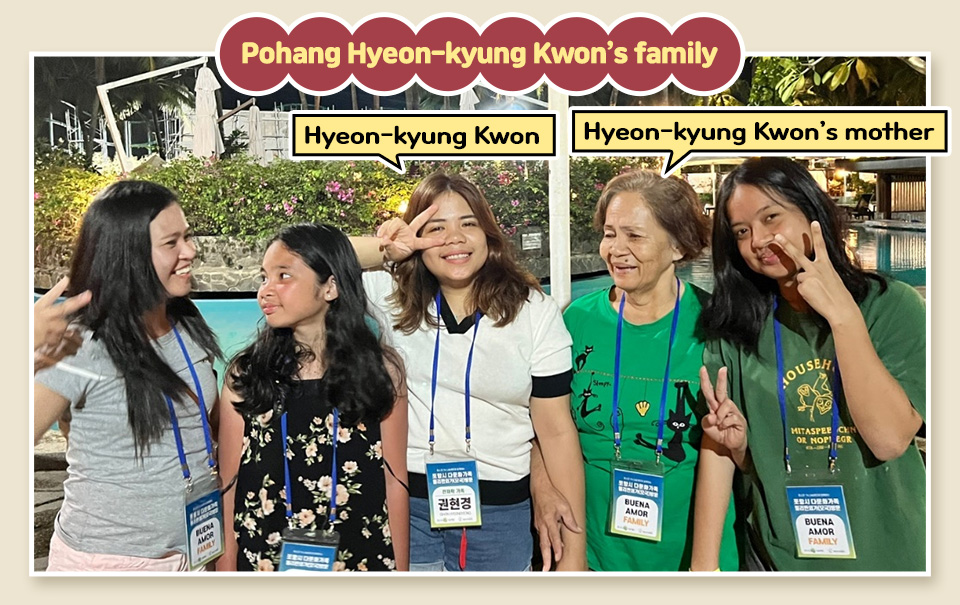
I can’t express my longing for my mother in words. It was like a dream to meet mother in person after seven long years, thanks to the family visit program. Every moment spent with her felt precious, as if time stood still. The inability to care for my extended family back home because I was busy living in Korea always weighed heavy on my heart, and I always felt guilty and frustrated. It brought immense joy to introduce my children to relatives they had never met and share our cultural heritage, and gave me renewed strength. My mother and I were always sad because we couldn’t hold a proper wedding for my younger brother. However, with the generous support of many people, we were able to organize a wedding ceremony during this visit. I extend my heartfelt thanks to everyone who offered their assistance.
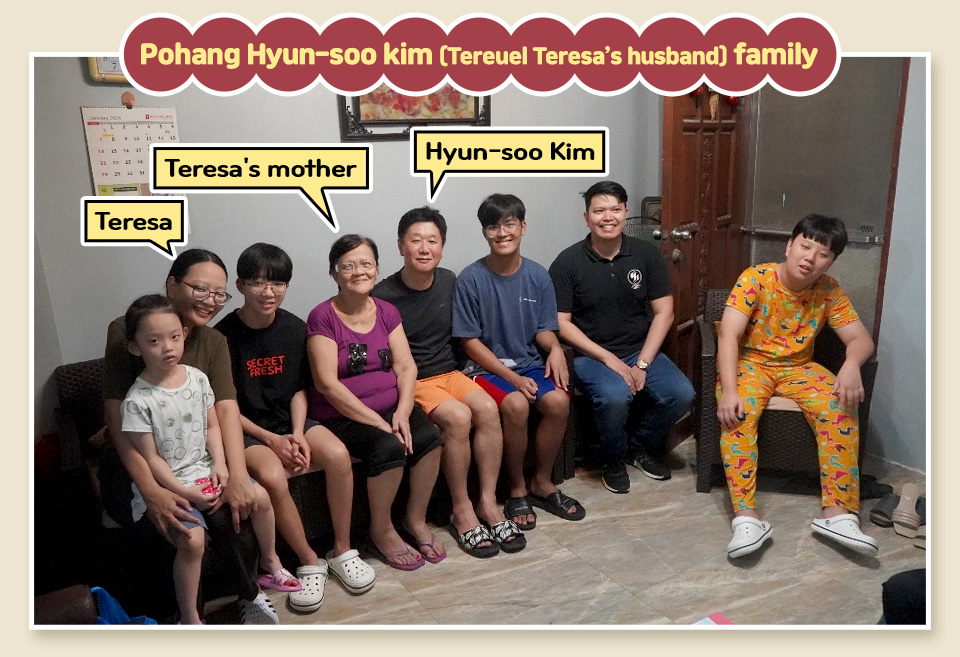
For years, I’ve promised to visit frequently, but work obligations kept me away from my family for more than a decade. I dearly missed my mother-in-law, who lovingly refers to me as Brian. She always wished for family gatherings, and it was nice to finally be able to reunite with relatives we haven’t seen in years. Despite the language barrier, our interactions were filled with gestures, and I think that will remain a happy memory with my mother-in-law.
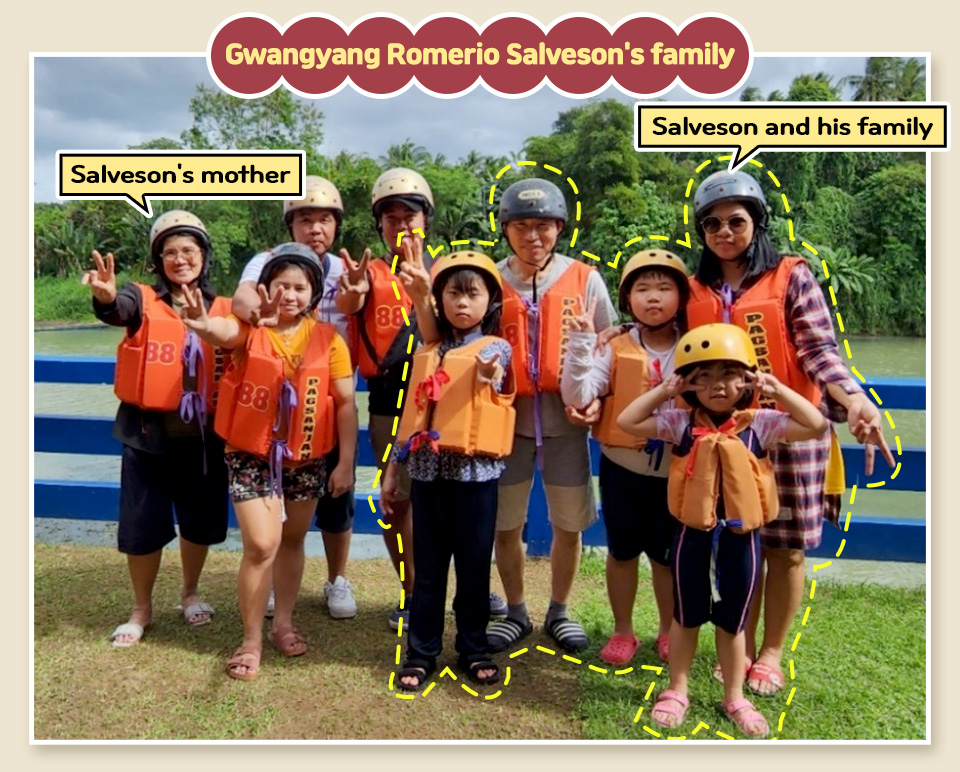
Reuniting with my beloved parents and siblings after seven long years was like a dream. I wanted to show them how well we’ve been doing, and my wish was finally granted! In particular, I was happy to introduce my youngest, who had never set foot in the Philippines before, to his maternal roots. Despite the financial challenges that prevented us from visiting for so long, the joy of meeting my parents without any worries was immeasurable. To all who contributed to this blissful reunion, my thanks and love!

After coming to Korea and starting a family, more than 16 years have passed, and our children have grown into middle school students. While facing financial hardships and the responsibility of caring for elderly in-laws, the thought of taking our entire family to the Philippines seemed like an unattainable dream. However, with the passing of our cherished elderly in-laws, whom we relied on like parents, and the growing longing for my mother and ailing brother back home, we were unexpectedly chosen for the family visit program. We were happy to share our harmonious family life with our relatives in the Philippines. Moreover, I am delighted that our children will carry memories of their grandmother and uncle with them for a lifetime. Our heartfelt gratitude goes to the POSCO 1% Foundation.
